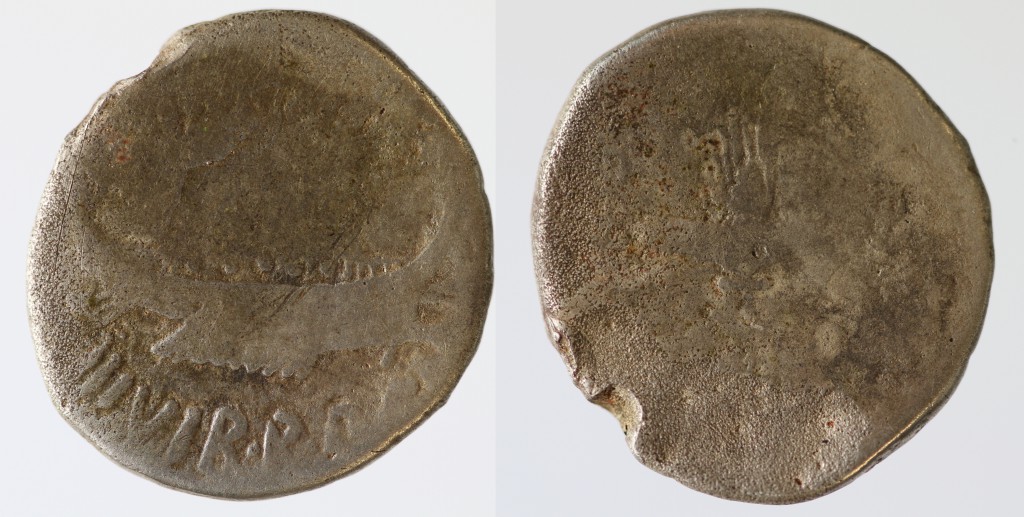April 21, 2016, by Will Leveritt
On this day in 43 BC the battle of Mutina was fought between Mark Antony and Octavian.
Text by Harry Tanton
Image by Sarah Jordan
Following the assassination of Julius Caesar in March 44 BC, Antony had assumed the leadership of the Caesarean party due to his friendship with the dictator. But he was directly challenged for this position by Octavian, who had been adopted by Caesar in his will and became his principal heir.

AR denarius of Marc Antony. Obverse has galley, [ANT AVG] III VIR R P C, Reverse has standards, [LEG _ ]. A numeral would have identified this as a particular legion.
Antony, who had been consul alongside Caesar in 44, was due to take command of the province of Macedonia in 43. But because the Senate, persuaded by the series of speeches which Cicero made against him (the Philippics), was turning against him, and seeing Octavian’s control of many troops, he wished to control a province closer to Rome, preferably one which contained a large number of troops which could be used against Rome if his interests or his person were threatened. He selected Cisalpine Gaul as a more desirable province for these reasons.
Sensing the turning tables, Antony, still possessing consular powers, pushed through legislation that handed the control of Cisalpine Gaul over to him. Governed by one of Caesar’s assassins, Decimus Brutus, Cisalpine Gaul now seemed a refuge for Antony who in November 44 had lost two of his legions to Octavian through promises of monetary gain.
Refusing to give up his province Decimus Brutus barricaded himself in the town of Mutina and there Antony and his forces besieged him. After the senate failed to peacefully resolve the dispute they moved, on the suggestion of Cicero, to make Octavian a senator, with the right to vote alongside the ex-consuls.
In addition, his command of his troops was legitimized by conferring pro-praetorian imperium upon him. He was authorized to accompany Hirtius and Pansa in relieving Decimus Brutus. Cicero and the Senate saw a chance to use the young man to help eradicate Antony; they intended then to discard Octavian. Octavian sensed a chance to wrest control of the Caesarian faction from Antony and establish himself as a major political player.
Before the battle at Mutina the armies first engaged each other near Forum Gallorum on 14 April, 43. There the forces of the republic were separated, Pansa alone came north from Rome while Antony occupied a position between him and the forces of Hirtius and Octavian.
Isolated, Pansa’s forces were destroyed and the consul himself was mortally wounded. However, the fresh troops of Hirtius were able to attack Antony’s legions before they could recover from their fight with Pansa. With both armies weakened Antony retreated to his encampment near Mutina.
A week later, on 21 April, Hirtius and Octavian launched an attack on Antony at Mutina. In the assault on Antony’s camp, Hirtius was killed. In his absence, Octavian intervened and was able to defeat Antony. Fearful of a second attack from Octavian, who had more troops, Antony retreated, crossing the Alps despite the fact that his siege was close to breaking Decimus and the defenders of Mutina.
With the deaths of the two consuls Octavian was able to seize the remains of their armies which significantly strengthened his military force. Testament to his growing power was the fact that he openly defied the Senate and refused to hand command of the senatorial armies to Decimus Brutus. He justified his action by arguing that the veterans of Caesar would never obey one of his assassins; he was further strengthened as many of Decimus Brutus’ own forces deserted him in favour of Octavian.
With waning power Decimus Brutus fled Italy aiming to link up with Marcus Junius Brutus and Cassius Longinus in Macedonia. However he was intercepted by a Gallic chief loyal to Antony and was subsequently executed.
The Battle of Mutina established Octavian as a key player in Rome. The Senate’s plan to use Octavian had backfired as he went on to demand the consulship and when this was not forthcoming he marched on Rome with his legions. Facing no military obstacles his demand was quickly granted and he entered into office on 19 August, 43 at the age of only nineteen.
Subsequently, Antony crossed back over the Alps with fresh troops. Octavian demanded that Antony’s status as public enemy be revoked and a few months later he met with Antony and Lepidus (another Caesarean) and made plans to establish the Second Triumvirate. The power of the Senate had been broken and the Republic was now all but dead. The three men would assume total control of the state and take revenge upon Caesar’s killers.
No comments yet, fill out a comment to be the first

Leave a Reply